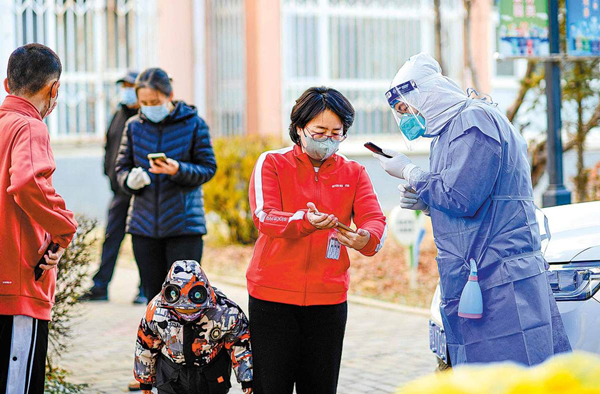COVID plan refined to put emphasis on precision

A medical worker collects data from residents who are about to take nucleic acid tests for COVID-19 in Hohhot, Inner Mongolia autonomous region. [Photo by WANG ZHENG/FOR CHINA DAILY]
China's top health authority warned on Thursday against relaxing COVID-19 control measures and imposing unnecessary restrictions, saying that the current refined response strategy aims for higher precision amid a growing number of domestic infections.
National Health Commission spokesman Mi Feng said that leaning toward harsher or looser virus containment approaches are both discouraged, so as to ensure that the adjusted measures outlined in a 20-item notice published last week will be fully implemented.
Shen Hongbing, deputy director of the National Administration of Disease Prevention and Control, said that since the notice was released on Nov 11, the daily number of malpractice complaints regarding COVID-19 control filed on the Health Commission's message board had dropped by nearly 40 percent to 2,014 on Wednesday.
Local task forces dedicated to addressing such problems have handled 130,000 cases and resolved 99 percent of them as of Thursday noon, he said.
However, Shen said, problems remain, such as forcing travelers from low-risk areas to return or undergo quarantine, expanding at-risk regions and groups.
Under the new rule, only close contacts of confirmed patients should be placed in centralized quarantine facilities, as secondary close contacts no longer need to be traced.
"Limiting contact tracing is aimed at taking more scientific and accurate action and making more efficient use of resources in epidemiological tracing, isolation venues and logistic services," he said.
Shen said that areas that see no new cases should focus on regular and thorough screening of high-risk workers, while in virus-hit regions, the mass testing strategy should be tailored to fit the severity of the risk of transmission.
Guo Yanhong, head of the National Health Commission's emergency response bureau, said more efforts will be devoted to strengthening treatment capacity and enhancing triage practices for patients.


 Shaoxing Showdowns
Shaoxing Showdowns Zhejiang: A Decade of Progress
Zhejiang: A Decade of Progress Shaoxing in expats' eyes
Shaoxing in expats' eyes